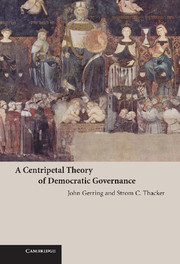Book contents
- Frontmatter
- Contents
- List of Figures
- List of Tables
- Acknowledgments
- A Centripetal Theory of Democratic Governance
- 1 Models of Governance
- PART ONE CAUSAL MECHANISMS
- 2 Party Government
- 3 Conflict Mediation
- 4 Policy Coordination
- PART TWO EMPIRICS
- PART THREE CONCLUSIONS
- Appendix A Defining Good Governance
- Appendix B Alternative Theories Revisited
- Sources
- Author Index
- Subject Index
2 - Party Government
Published online by Cambridge University Press: 06 July 2010
- Frontmatter
- Contents
- List of Figures
- List of Tables
- Acknowledgments
- A Centripetal Theory of Democratic Governance
- 1 Models of Governance
- PART ONE CAUSAL MECHANISMS
- 2 Party Government
- 3 Conflict Mediation
- 4 Policy Coordination
- PART TWO EMPIRICS
- PART THREE CONCLUSIONS
- Appendix A Defining Good Governance
- Appendix B Alternative Theories Revisited
- Sources
- Author Index
- Subject Index
Summary
E. E. Schattschneider points out that every polity is biased in favor of some forms of popular participation, and against others. Political institutions can hardly play a neutral role in the organization of interests, ideas, and identities. Some activities will be “mobilized in” and others will be “mobilized out.” We argue that the bias of a polity with a centripetal constitution – that is, unitary, parliamentary, and closed-list PR – is toward strong parties. Conversely, decentralized constitutions should encourage weaker, more diffuse parties and issue- and sector-specific organizations.
A “strong” political party, let us say, is characterized by a high degree of internal unity, external differentiation, and centralized control. If most parties in a polity are strong (in these senses), one may infer that parties are the dominant governing power in that polity. “Party government” obtains. Operationally, this means that in this polity nominating decisions stick; the party vote trumps the personal vote; issue space is broadly ideological rather than issue-specific; elective offices at the national level are effectively restricted to party members; ticket splitting is rare; the process of candidate selection is confined to party members; the system of campaign finance is centralized in the hands of the national party organization; legislative activity is partisan rather than individualistic; and national, regional, and local branches of a party are ideologically aligned with one another.
- Type
- Chapter
- Information
- A Centripetal Theory of Democratic Governance , pp. 27 - 38Publisher: Cambridge University PressPrint publication year: 2008



